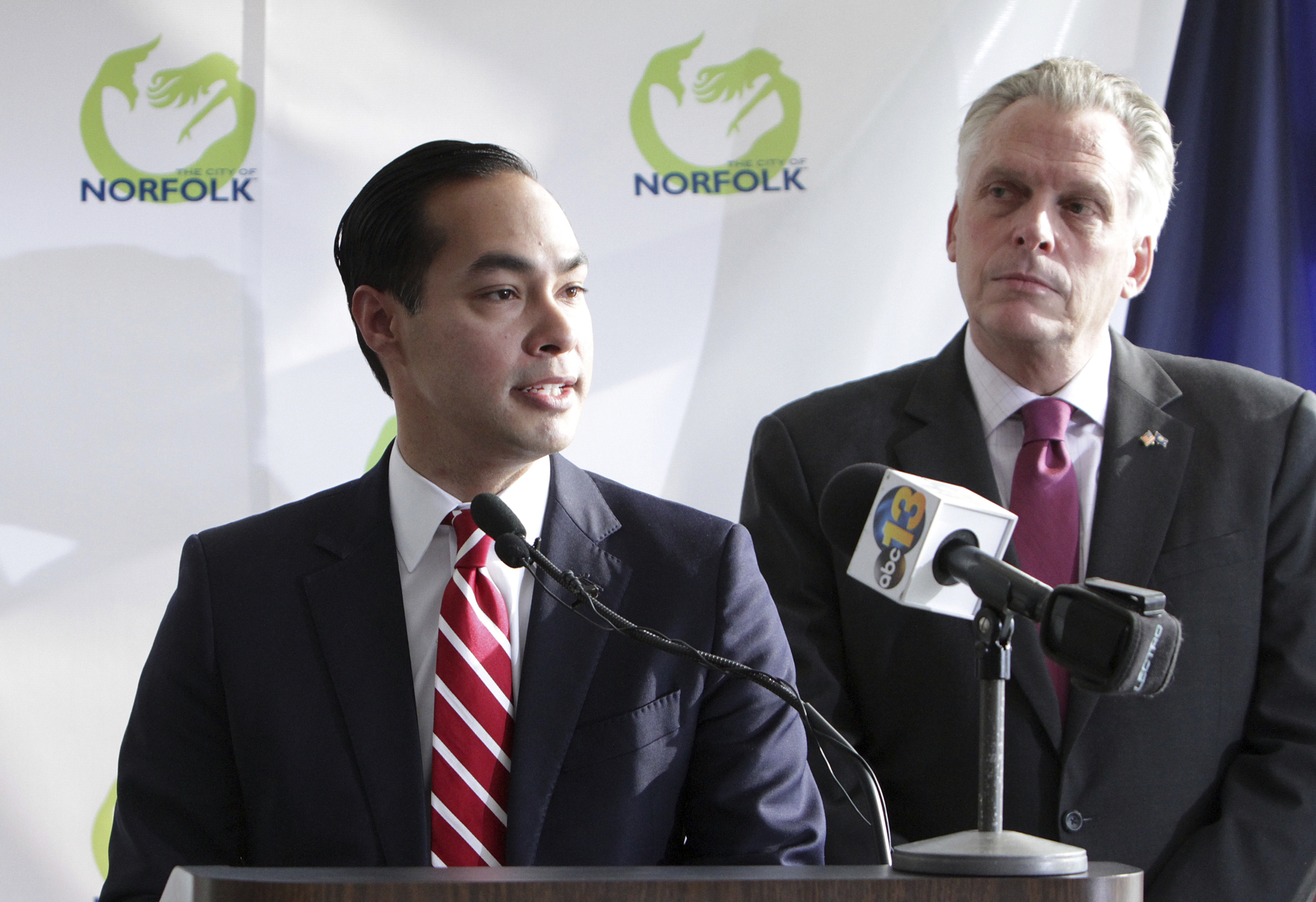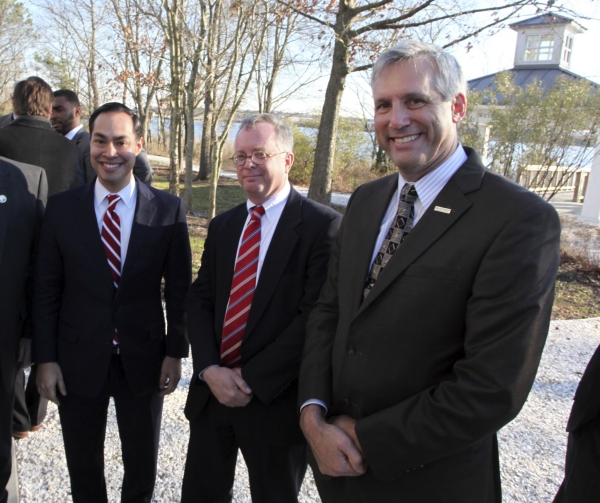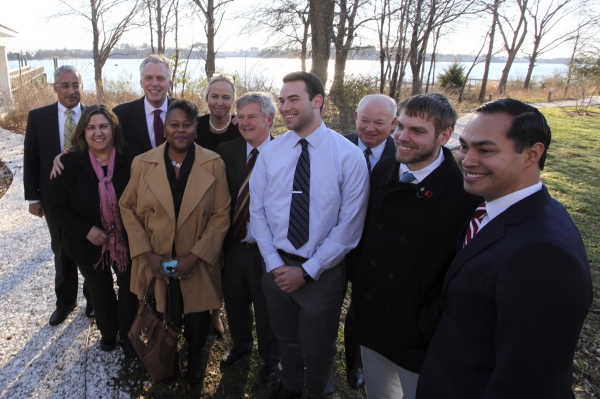Virginia Wins $120.5 Million Resilience Grant Spearheaded by Old Dominion University
January 21, 2016
 Julian Castro, the U.S. Secretary for Housing and Urban Development, speaks with Virginia Gov. Terry McAuliffe in the background, during the announcement that Virginia received a $120 million award from the U.S. Department of Housing and Urban Development’s National Disaster Resilience Competition (NDRC).
Julian Castro, the U.S. Secretary for Housing and Urban Development, speaks with Virginia Gov. Terry McAuliffe in the background, during the announcement that Virginia received a $120 million award from the U.S. Department of Housing and Urban Development’s National Disaster Resilience Competition (NDRC).
 (LtoR) Julian Castro, the U.S. Secretary for Housing and Urban Development is joined by Morris Foster, ODU vice president for research; and Paul Olsen, the University’s director of federal, commonwealth and municipal programs and partnerships.
(LtoR) Julian Castro, the U.S. Secretary for Housing and Urban Development is joined by Morris Foster, ODU vice president for research; and Paul Olsen, the University’s director of federal, commonwealth and municipal programs and partnerships.
 At the Jan. 21 grant announcement, Mujde Erten-Unal, associate professor of civil and environmental engineering (second from left) is congratulated by Virginia Gov. Terry McAuliffe. Erten-Unal co-led a project where Old Dominion University engineering students and Hampton University architecture students conducted a neighborhood resiliency adaptation of Norfolk’s historic Chesterfield Heights neighborhood.
At the Jan. 21 grant announcement, Mujde Erten-Unal, associate professor of civil and environmental engineering (second from left) is congratulated by Virginia Gov. Terry McAuliffe. Erten-Unal co-led a project where Old Dominion University engineering students and Hampton University architecture students conducted a neighborhood resiliency adaptation of Norfolk’s historic Chesterfield Heights neighborhood.
A proposal coordinated by Old Dominion University on behalf of the Commonwealth of Virginia and three Hampton Roads communities to help protect the region from the effects of recurrent flooding has received a multimillion-dollar award from the federal Department of Housing and Urban Development (HUD).
To help combat the threat from rising seas, a total of more than $120 million will flow to the region from the National Disaster Resilience Competition (NDRC), which was sponsored by HUD with assistance from the Rockefeller Foundation.
The Virginia application process was spearheaded by Old Dominion, which for decades has been a hub of climate change and sea level rise research. It was one of 13 projects to receive funding through the NDRC, in a competitive bid process that saw 40 entries from 26 states and Puerto Rico.
"The 13 winners of this competition exemplify what it means to lead when it comes to resilience and sustainability," said HUD Secretary Julian Castro, who attended the Jan. 21 announcement at Norfolk's Grandy Village Learning Center. "The need for decisive action is clear. Climate change is real and we see its effects every day. But no fire, no flood and no disaster is stronger than the American people. Norfolk, Virginia demonstrates that."
The award to Hampton Roads will fund a series of projects centered in Norfolk under the common theme of the proposal, an innovative living with water approach called "thRIVe: Resilience in Virginia."
Old Dominion played a key coordinating role in the application, which was submitted by Virginia's Department of Housing and Community Development (DHCD), on behalf of the City of Norfolk, City of Chesapeake and City of Newport News.
"Through President John R. Broderick's forward-thinking leadership on coastal resilience, Old Dominion played a key role in helping the Commonwealth plan, assemble, and write Virginia's successful application," said Morris Foster, vice president for research at the University. "NDRC funds will make a transformational difference in Hampton Roads' response to sea level rise."
Virginia Gov. Terry McAuliffe, who also attended the event in Norfolk, spoke about the dedication and passion that so many Virginia government, community and academic leaders demonstrated in pulling together the application.
"A total of 75 people across the Commonwealth have worked for a year to make this proposal happen. I am standing here today because of those 75 people," McAuliffe said.
The work that ODU played in coordinating the project was recognized during the event by U.S. Congressman Robert "Bobby" Scott and Norfolk Mayor Paul Fraim.
"A special thank you to Old Dominion University, who took on the difficult task of pulling together this grant application," Fraim said. "We believe that making water the focal point of life in Hampton Roads can have a positive outcome. We welcome the chance to show the world how a water-based economy can thrive in the new economy."
The grant development process involved staff from Old Dominion's Office of Research and Virginia Modeling, Analysis and Simulation Center (VMASC),as well as the cities of Chesapeake, Norfolk and Newport News, all of whom gathered input from local stakeholders. In all, more than 100 workshops, work groups, committee meetings and forums were held to seek input into the process.
"Old Dominion University grant professionals partnered with the Department of Housing and Community Development and the cities to develop potential grant projects and write the funding proposal over the course of a year. We're excited to have played a role in Virginia's successful application," said Karen Eck, assistant vice president for research.
The end product, thRIVe, aligns with HUD's National Objective to directly benefit low- and moderate-income residents and households by focusing on unmet recovery needs, as well as building regional resilience capacity to adapt to sea level rise and manage extreme weather events.
ThRIVe has five major goals: unite the region; create coastal resilience; build water management solutions; improve economic vitality; and strengthen vulnerable neighborhoods. This comprehensive approach is designed to capitalize on the region's strengths and convert risk and vulnerabilities into economic opportunities, and the ability to demonstrate best practices to low-lying areas nationwide.
A portion of this work began with a comprehensive survey of vulnerability in Hampton Roads, led by Joshua Behr, associate research professor at Old Dominion's VMASC.
"The Hampton Roads region has been remarkably proactive in thinking strategically about building resilience in response to a changing environment," Behr said. "The vision and professionalism that grew out of this active collaboration was dynamic, admired outside the State and was a key ingredient to the success of the grant."
HUD made $1 billion available through the competition, to communities that have been struck by natural disasters in recent years, about 20 percent of which was set aside for Superstorm Sandy recovery in New Jersey and New York.
All states with counties that experienced a Presidentially-declared major disaster in 2011, 2012 or 2013 were eligible to apply for funding to address unmet needs, as well as vulnerabilities to future extreme events.

